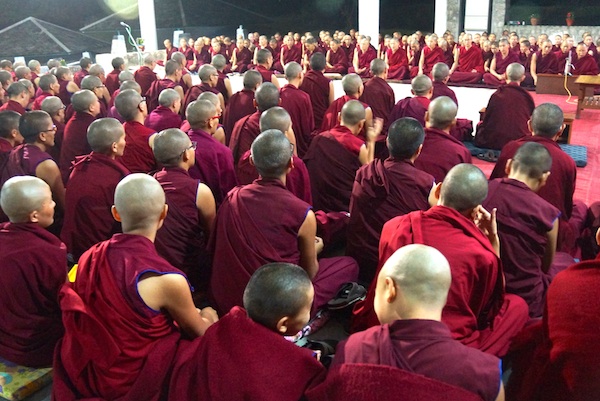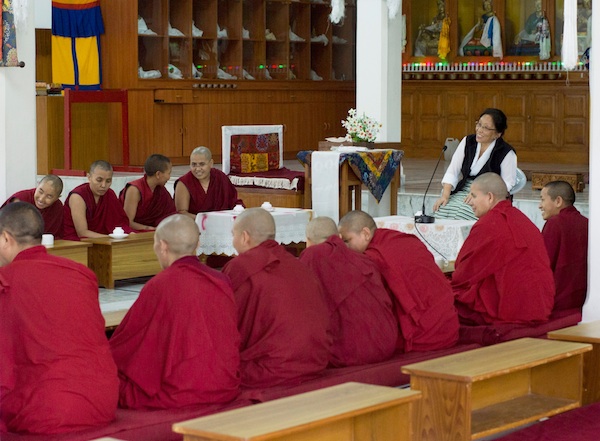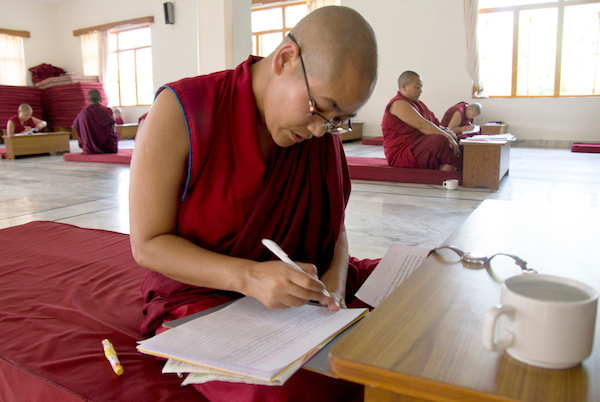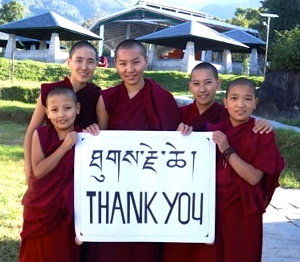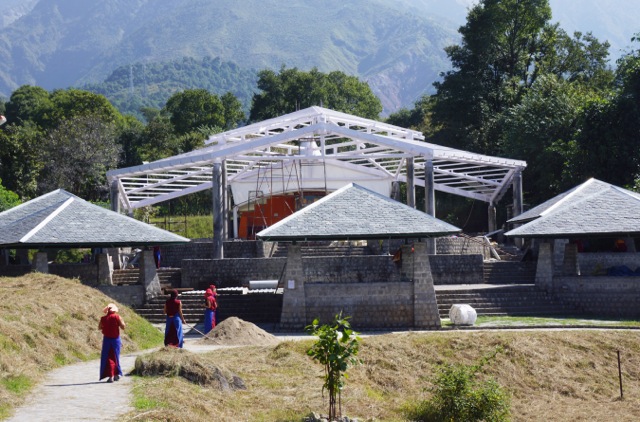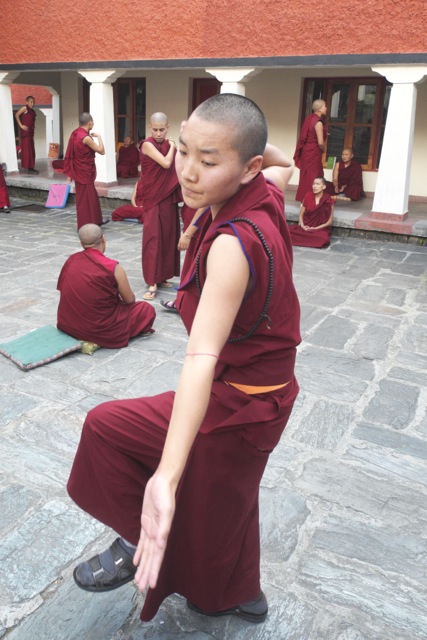This spring we reached out to our supporters around the world with our Wish List of special projects that need funding in 2015.
We’ve had a wonderful response so far and we wanted to update you on our progress with the various projects and programs to help the nuns.
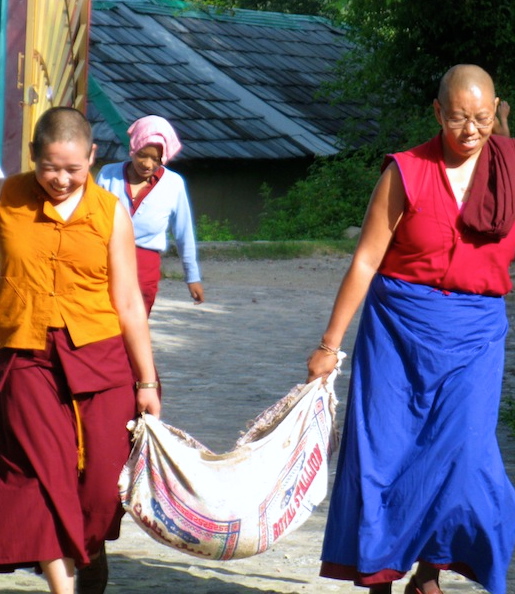 New Truck for Shugsep Nunnery
New Truck for Shugsep Nunnery
Thanks to Andrea in Albuquerque, Lorena in Roanoke and about 20 other donors, we have raised all the funds needed to replace the nunnery’s old pick-up truck which had broken down. It was so old that there were no longer parts readily available and the brakes did not work. Shugsep Nunnery will now have a new, 4-seat pick-up truck with plenty of space to transport groceries and vegetables from the market, as well as other heavy materials. It will also be used to take nuns to hospital in case of medical emergencies.
FULLY FUNDED!
 Kitchen Extension for Dolma Ling Nunnery
Kitchen Extension for Dolma Ling Nunnery
Thanks to our generous supporters, especially Kent and Marsha in Charlottesville, the Saint Paul Foundation and Lisa in California, work is well underway for the new kitchen extension for Dolma Ling Nunnery. The number of nuns and staff that must be fed daily at the nunnery has more than tripled since the kitchen was first built in 1993. The extension will increase the size of the kitchen by 750 square feet and will also allow the nuns to move the solar panels and water tanks to its flat roof, thereby solving leaks and maintenance issues. We look forward to sharing more news and photos of the kitchen extension soon.
FULLY FUNDED!
 Bike for India Office
Bike for India Office
This is a new item on our 2015 Wish List. Our headquarters is located at Dolma Ling Nunnery and Institute in the foothills of the Himalayas about 10 miles on hilly roads from the main town of Dharamsala in Himachal Pradesh. It’s a challenge to get from A to B and the office is facing transportation problems. We would very much appreciate donations to help us purchase a simple, low-cost Indian-made motorcycle that would enable the Tibetan Nuns Project staff to accomplish their many official tasks.
AMOUNT STILL NEEDED: US $1,420
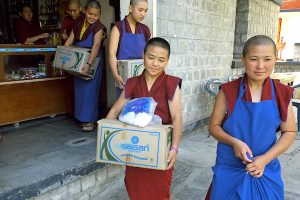 Truck for Dolma Ling
Truck for Dolma Ling
Dolma Ling Nunnery is home to over 230 nuns and the nunnery needs a small, multi-purpose pickup truck to manage their daily tasks. The nuns must travel often for supplies and hiring or renting private cars or taxis for these regular shopping errands is expensive and impractical. The nuns will use the pickup to get food and vegetables from the market, to transport supplies for their many self-sufficiency projects and for various heavy-load materials. This kind of vehicle is more useful and safer than a normal rented car. Without a proper pickup truck with ample space and weight in the back, the steep hills of the area are dangerous and difficult.
AMOUNT STILL NEEDED: US $10,500
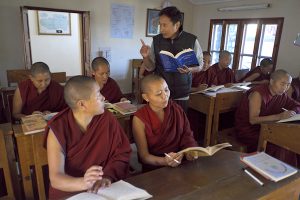 Funds for Teachers’ Salaries
Funds for Teachers’ Salaries
Each year the Tibetan Nuns Project seeks to fund 15 teachers at different nunneries. The cost of one teacher’s salary ranges from $1500 to $5000 per year, depending on the location of the nunnery in India and the skills of the teacher. Our special thanks to Janice in Menlo Park for her support of teachers’ salaries.
AMOUNT STILL NEEDED: US $2,844
Donate to Teachers’ Salaries Fund
 Nunnery Maintenance and Renovations
Nunnery Maintenance and Renovations
Since the Tibetan Nuns Project was founded in 1987, we have established two important nunneries in India, Dolma Ling Nunnery and Institute and Shugsep Nunnery and Institute, both of which will have major anniversaries this year — 10 years and 5 years respectively. Maintenance and upkeep of the nunneries is critical in the demanding climate of northern India. By keeping buildings in good condition we can help avoid costly repairs in future. Our maintenance fund will help pay for things such as painting which must be done every 3 to 5 years and roof repairs.
AMOUNT STILL NEEDED: $10,340
Donate to the Maintenance Fund
 Inter-Nunnery Debate Scholarships
Inter-Nunnery Debate Scholarships
This September marks the 20th anniversary of the annual inter-nunnery debate, the Jang Gonchoe. Until 1995, the Jang Gonchoe was only open to monks. Now the inter-nunnery debate provides a very important learning opportunity for the nuns and helps them to prepare for higher degrees and leadership roles.
AMOUNT STILL NEEDED: $14,190
Provide scholarships to the Jang Gonchoe
 Jang Gonchoe Endowment
Jang Gonchoe Endowment
Last year we created a special endowment to support the annual inter-nunnery debate, the Jang Gonchoe, in perpetuity. We received an initial gift of $35,000 from a nun living in France. A gift to the Jang Gonchoe Endowment Fund will help to preserve the Tibetan culture and open up a centuries-old tradition to the nuns, enabling and empowering them to become great teachers in their own right. The benefit of this is inestimable and will be an enduring legacy for generations to come.
AMOUNT STILL NEEDED: $238,000
Donate to the Jang Gonchoe Endowment
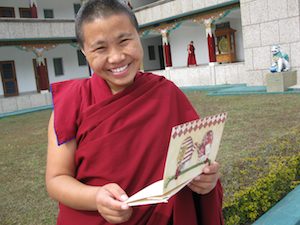 Sponsors for Individual Nuns
Sponsors for Individual Nuns
Thank you to all our new and existing sponsors! Sponsorship remains the heart of our work. We still need many more sponsors. If you’re already a sponsor, perhaps you would consider increasing the amount you are giving or supporting an additional nun. If you are not yet a sponsor, would you consider becoming one today? The cost for sponsorship is US $30 a month. Another option is to gather a group of friends, family, colleagues or sangha members and sponsor a nun together. Click here for sponsorship.
 Monthly Donors
Monthly Donors
It is now possible to make recurring gifts through our website using your credit card or direct debit. Even a modest gift of $5 or $10 a month would help educate, feed, clothe and provide health care for the nuns in India.
Become a regular donor
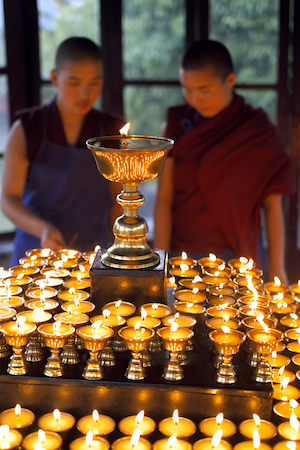 Creating Legacies
Creating Legacies
A special way that you can help generations of future nuns is by including a gift in your will to the Tibetan Nuns Project. If enough of our committed supporters are able to make these very special gifts then the nuns and nunneries will be able to thrive and grow well into the future, even in the uncertain situation of living as refugees in a foreign land. As one donor has said, “A donation to this cause benefits beyond helping just the nuns… it benefits the Tibetan culture, it benefits refugees from Tibet, it benefits education for women, it benefits the Buddhist religion and community and all of this spreads like a ripple of compassion for others beyond that community. This is not charity; it is an investment in humanity.” To learn how you can leave a legacy of compassion please email info@tnp.org or call us at 206-652-8901.

